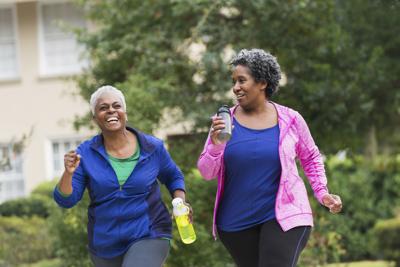Recent studies found that exercise was just as effective as drugs when treating such conditions as heart disease and stroke. In some cases it even outperformed standard treatment. A study of 300,000 patients found that frequent exercise and drug therapies such as beta-blockers and blood thinners provided similar results. When treating stroke exercise was actually more effective than taking anticoagulant medications.
Even after numerous studies only one-third of clinicians prescribed exercise. Exercise could not only boost the health of the average American significantly but could also save patients thousands of dollars a year in medical costs.
Beta-blockers help treat heart disease but have a number of side effects such as fatigue, dizziness, upset stomach and cold hands. A single 30-minute exercise session has been shown to lower blood pressure for 24 hours in hypertensive patients. That same 30-minute exercise session can reduce both your systolic (top number) and your diastolic (bottom number) pressure by 5 to 10 points. When you consistently exercise it can also improve your cholesterol levels.
The reason exercise works is because your heart is a muscle. Exercise forces your heart to pump longer which will eventually make your heart stronger, preventing the buildup of plaques that can rupture and lead to a heart attack or stroke. Most heart attack and stroke survivors are afraid to exercise. They have to move past their fears. Patients who exercise don’t require as much medication, need fewer major surgeries and are 25% less likely to die from a second heart attack.
Exercise stimulates muscle strength. Muscles weaken when you don’t exercise. This applies to both men and women. Regular exercise helps to build muscle. If you’ve never exercised before, find a beginner exercise group. A professional can help you get started. Calisthenics, resistance training with weights or machines will strengthen and tone your body. Do at least one exercise for each body part. Start your program slowly and be consistent. If you’re under 18, you should never do heavy weight bearing exercises such as deadlifts, behind the neck presses, bent lateral raises, clean and jerk, standing toe raises and squats with weights on the back. These exercises place too much stress on the spine and joint areas because your bones are still growing and not completely fused. Your bones are not completely fused until about age 18. Keep a diary to keep track of your progress. After a few months, you may want to get into weight training.
Unlike many other aerobic exercises, walking is relatively free from the many hazards of aerobic exercises. Aerobic exercises such as jogging, jumping rope or high impact aerobic can cause joint pain, stress fractures, muscle pulls and other problems. When you use a high impact exercise to get in your aerobics, you put 3 to 4 times your body weight on every joint in the body. That’s not to say you shouldn’t use high impact exercises such as jogging, but you should be aware of the problems that can be associated with them. When you walk, the impact of each step is only 1 1/2 times your body weight. Studies have shown that you can get the same benefits by walking sixty minutes, four times a week as you can by running thirty minutes three times a week.
Remember, walking is relatively free from injuries but you can still overdo it. If you begin to feel pain, stop walking for a couple of days, then slowly work your way back into your program. Start walking at your own level, even if it’s only for a few minutes. Then gradually build on the time, pace and distance.
You also need to consume a balance diet. To have a balance diet you should consume between 13 to 16 calories per pound of body weight daily. Your daily intake of food should include 2 to 3 servings of protein, 4 to 6 servings of vegetables, 2 to 3 servings of a grain and 3 to 6 servings of fruit. You should ingest no more than 14 grams of saturated fat, which is 126 calories.
Sleep is another factor that can affect your body’s ability to recover. If you get the right amount of sleep you will get the most out of your body. Research has shown that when healthy adults are allowed to sleep unrestricted, the average time slept is 8 to 8.5 hours.
Exercise can improve your health but it can also hide illness. When you exercise, your body’s endorphin level is increased by 35% to 40%. At this level your body may not feel the pain associated with the early warning signals of an illness. Regular checkups should always be part of a good fitness program. So before starting your fitness program always consult your physician.








(0) comments
Welcome to the discussion.
Log In
Keep it Clean. Please avoid obscene, vulgar, lewd, racist or sexually-oriented language.
PLEASE TURN OFF YOUR CAPS LOCK.
Don't Threaten. Threats of harming another person will not be tolerated.
Be Truthful. Don't knowingly lie about anyone or anything.
Be Nice. No racism, sexism or any sort of -ism that is degrading to another person.
Be Proactive. Use the 'Report' link on each comment to let us know of abusive posts.
Share with Us. We'd love to hear eyewitness accounts, the history behind an article.